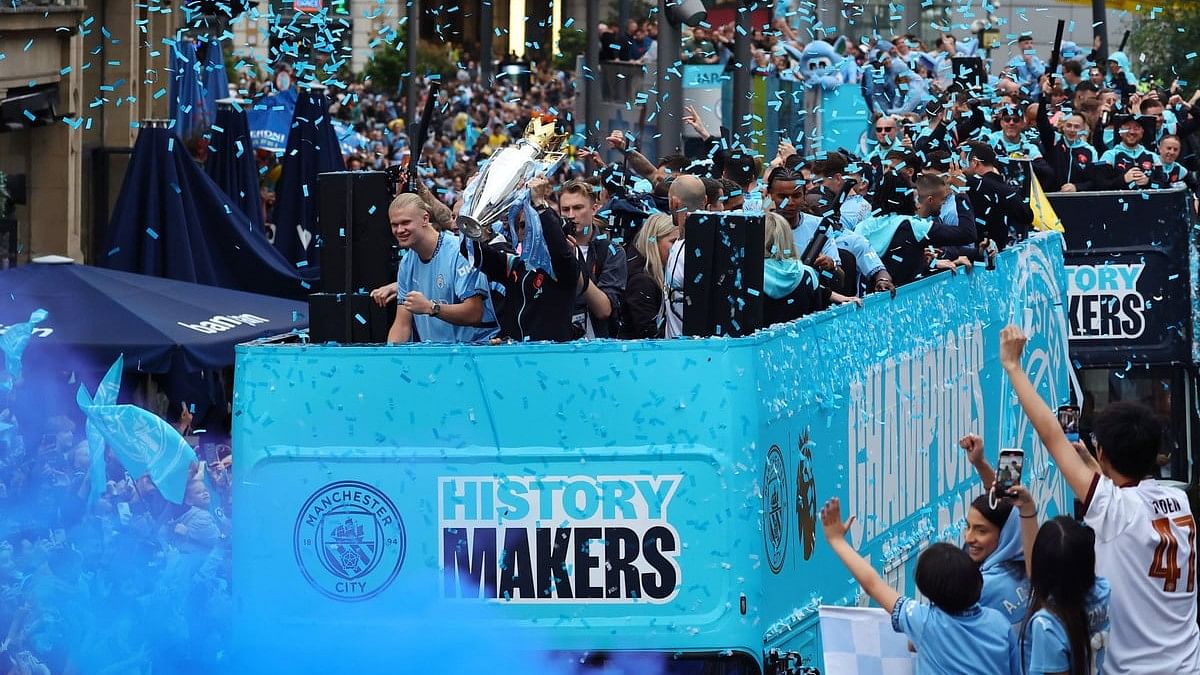
The Manchester City team celebrate their Premier League triumph.
Credit: Reuters Photo
By Matthew Brooker
Money talks in football. An influx of rich owners helped turn England’s Premier League into the world’s most lucrative national soccer competition. Chelsea FC won the title for the first time in 50 years in 2005 after its takeover by Russian billionaire Roman Abramovich. Saudi Arabia’s 2021 purchase of Newcastle United FC propelled it back into Europe’s elite Champions League after a two-decade absence. But the urge to splurge might yet tear the game apart.
Manchester City, controlled by Abu Dhabi United Group, is challenging the legality of the Premier League’s so-called Associated Party Transaction, or APT, regulations that are designed to prevent teams from signing inflated sponsorship deals with companies linked to their owners. The club argues the rules are anti-competitive and that the league’s voting system produces a “tyranny of the majority,” according to a 165-page document cited by the Times. A two-week arbitration hearing is scheduled to start Monday. It’s an unprecedented action: Victory for Manchester City could throw the Premier League’s governance into disarray.
For a club that just became champions for a record fourth year running, and that has ascended from mid-table mediocrity to become the UK soccer universe’s biggest revenue-generator under its Abu Dhabi owners, the claim that Manchester City is being unfairly held back might strike some as, well, a little rich. The team had record revenue of £712.8 million ($910 million) in the 12 months through June 30 last year, ranking it second globally behind only Spain’s Real Madrid, based on exchange rates at the time. It has won six of the past seven Premier League titles — a level of dominance unparalleled in more than 130 years of top-tier competition.
The APT rules matter because they affect how much a club can spend on players. Deep-pocketed owners can’t just shove in as much cash as they like to fund transfers and give teams an edge. Europe-wide “financial fair play” rules restrict clubs to spending no more than 70 per cent of their revenue on squad costs. A bigger top line means more money in the kitty to fund marquee acquisitions like the £100 million that City paid for England midfielder Jack Grealish in 2021. Owners with means can boost revenue by entering into business transactions with other entities that they control. Given the incentive to inflate values, who is to say what these deals are really worth?
The principle here is straightforward. It’s analogous to the related-party transaction rules that are a common feature on stock exchanges. Self-dealing carries an inherent potential for abuse. Controlling shareholders can extract value from public companies by selling assets to their private vehicles at an undervaluation, or buying assets from them at inflated prices. So such transactions typically require an independent valuation report and a vote by minority shareholders. In Hong Kong, where your correspondent used to reside (and where there is a preponderance of controlling shareholders with a penchant for self-dealing), the newspapers used to bulge with announcements of this type.
The concern in the football context is the insertion rather than the extraction of value. Instead of minority shareholders, those potentially disadvantaged are rival clubs that may be pulled into an unsustainable spending arm’s race — as well as viewers of the sport, who face being condemned to a duller and more predictable spectacle in which only the most extravagantly wealthy can afford to compete. Meanwhile, the Premier League’s mechanism for dealing with the issue is similar to that of stock exchanges: Rules say that associated party transactions must be independently assessed to be of fair market value. This seems sensible to me.
There’s a legitimate case to make that the financial fair play regime (Profit and Sustainability Rules, in Premier League parlance) is an unfair restraint that entrenches the competitive position of clubs already commanding the biggest revenue share. But, come on: This is Manchester City we’re talking about. The argument would carry more weight if it was coming from one of the Premier League’s struggling underdogs rather than a serial champion backed by the resources of a Middle Eastern petrostate.
Premier League rule changes require support from a two-thirds majority, or 14 out of 20 clubs. Tyranny? Not obviously. "This is pretty standard in corporate governance", says Daniel Gore, a senior associate at law firm Withers in London, who describes the rules as reasonable and democratic.
The wider context here is the 115 charges levied against Manchester City of breaching financial regulations between 2009 and 2018, some of which are linked to alleged inflation of sponsorship deals with Abu Dhabi entities. That case is due to be heard this autumn. The APT challenge lays down a preemptive marker, signaling the level of combativeness the league can expect. In February 2023, the New York Times noted the “army of lawyers” the club employed, saying it used a “bare-knuckle” strategy to overwhelm opponents in a war of attrition.
That may prove an effective legal approach, but it’s unlikely to win the club many friends. Reaction in British media has been mostly negative, with the Independent calling it “an assault on the fabric of football” and the Times warning of anarchy. Fans of lower-league Millwall are renowned for chanting “no one likes us, we don’t care.” On current form, that might make a new motto for England’s most successful club.